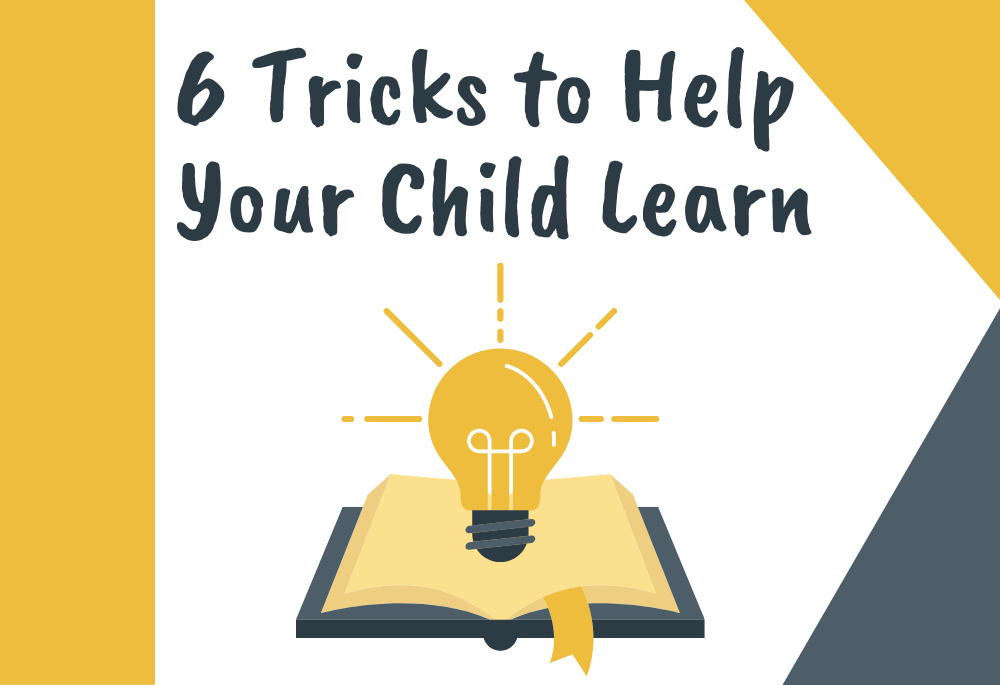After a discussion with clinical psychologist Carolyn Cavanaugh, we would like to offer you these six tricks for helping your kids learn.
MAKE SURE YOUR CHILD’S NEEDS ARE MET
We know… this may sound silly and you’re thinking duh! But this is so much more important than you think. Making sure their needs are met on ALL levels (physical, social, and emotional) is crucial to their learning. Are they hungry? Sleepy? Bored? If these needs aren’t fully met, they aren’t able to process information and learn properly. To ensure your child is ready to learn, listen to them. Look for ways you can connect and share the love. Find out how you can best help them meet their needs.

ENCOURAGE PASSIONATE CURIOSITY
Children need someone to set the example and encourage passionate curiosity. Allow your child to explore and become passionate about what they learn. Children are like sponges; they absorb more information than you think is feasible. To help your child learn, encourage them to ask questions and think critically. Children are naturally curious beings. It is your job to leverage that natural curiosity for them so they continue to grow and absorb as much as possible.

REINFORCE THE MESSAGES TEACHERS ARE SENDING
In order to make sure your child is getting the best learning experience possible, communicate with your child’s educator. Make sure you are on the same page so you can reinforce the same messages to your child. Maybe math is taught differently than you remember. Maybe your children are learning new French grammar instead of the traditional one. Reinforcement at home is crucial to helping your child learn and retain information. We understand there can be disagreements, but if you undermine what a child learns in the classroom, this will actually hinder their growth. Communicate with your child’s educator at the start of each school year and throughout the year!

FOCUS ON THE PROCESS OF LEARNING
Using grades to measure achievement isn’t the most effective way to ensure your child’s progress. Being critical of grades hinders learning because it stresses the child, which prevents them from retaining information. The process of learning is what really matters. Figure out what your child likes and where they struggle. Use their personal cognitive strengths to encourage the process of learning instead of the outcome. Make it fun and enjoyable by tailoring learning to your child’s needs and interests and you’ll see just how much they are able to retain!

HELP KIDS COPE WITH STRESS
As stated in #4, stress prevents your child from learning. Don’t put so much emphasis on your child’s grades or punish them for falling behind. Children are brilliant–you just need to help them get there by focusing on the process of learning. Help your child deal with the stresses of school by assisting them in developing coping mechanisms. This means setting a good example, as well as observing your child to figure out their strength and challenges. Be attentive to their struggles. If we can intervene early on, we can help their lifelong growth. Utilize their cognitive strengths to help them do well while learning and never invalidate them when they come to you for help.
UTILIZE STORYTELLING AND CREATIVITY
Storytelling and creativity are extremely important forces in a child’s learning process. We know children are naturally curious and creative. From a cognitive perspective, stories are a wonderful way for children to learn. They give focus and organizational structure to learning. Stories improve memory, allowing children to retain more information. The best educators harness creativity and storytelling to develop those creative thinking skills.
Try One Story a Day to start your child’s reading journey!
—
Thank you to our friends at Arizona State University for this blog post.





![Our Farm in the City [hardcover]](https://www.dc-canada.ca/wp-content/uploads/2021/04/Book_OurFarmInTheCity-100x100.png)


